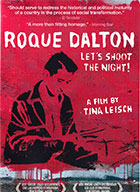
Roque Dalton: Let’s Shoot the Night 2013
Distributed by Icarus Films, 32 Court St., 21st Floor, Brooklyn, NY 11201; 800-876-1710
Produced by Witcraft Szenario, KINOKI, Ursula Wolschlager
Directed by Tina Leisch
DVD, color, 85 min.
Middle School - General Adult
El Salvador, Latin America, Central America, Literature, Poetry, Politics, Revolution, Identity, Government, Social Movements, Cuba
Date Entered: 01/14/2016
Reviewed by Malcolm L. Rigsby, Department of Sociology, Human Services, & Criminal Justice, Henderson State University, Arkadelphia, ArkansasAn inspiring glimpse into the life of a patriotic hero. ~ Malcolm L. Rigsby
“I believe the world is beautiful and poetry like bread is for everyone. And that my veins don’t end in me but in the unanimous blood of those who struggle for life, love, things, landscape and bread, the poetry of everyone.” And so the film begins with the setting and the life and love of Roque Dalton. Since the assassination of Roque Dalton in 1975 his poetry has been romanticized in song and glorified in readings. Perhaps it is in this way that the life of Roque Dalton has created a nationalism that has become the salvation of the common people of El Salvador. Once forbidden to read or recite Rogue’s poetry now resonates with immortality in the national identity of the El Salvadorian.
Leisch weaves into her story many individual accounts, some evidently skewed by time, which clearly show the depth of meaning that resonates from Dalton’s heart felt love for the people and his homeland. Like Dalton’s poetry the people speak from their hearts. We all need heroes who have given all for our prosperity. Revolution and change truly comes from many forms of activism. The power of words and images may actually resonate and outlive use of physical force in spurring change. As one narrator says: “Poetry is revolution, revolution is poetry”.
The story recounts that government’s restriction of Dalton’s poetry, his persecution, arrests, trials and sentences to death, his escape and exile and his returns to El Salvador. It was in his years of exile that allowed him his greatest personal freedom in writing. However, personal freedom is not always enough, especially when your true desire is for public freedom. Ironically, it appears that the source of his demise was from the revolutionaries whom he sought to promote. But the question presented is whether the true source was government infiltration in association with the CIA that ultimately led to his death.
Roque Dalton sometimes moves slowly and the viewer may drift. But these interludes allow for reflection on the story and the poetry which is very deeply emotional and resonates with every person who cares about the oppressed. I considered this an opportunity to click back and listen multiple times; each time gaining more insight. As noted in its awards Roque Dalton has excellent screen shots and sound. Editing flows well and this enhances its potential use in open discussion groups exploring social movement in terms of sociology, capitalism, and politics. The distributor provides a film trailer through Vimeo.
Awards
- Best Documentary, 2014 Cine Las Americas International Film Festival, Austin
- Best Documentary, 2014 Ojo Cojo International Film Festival, Madrid
- Best Editing, 2014 CinemAvvenire Film Festival, Rome